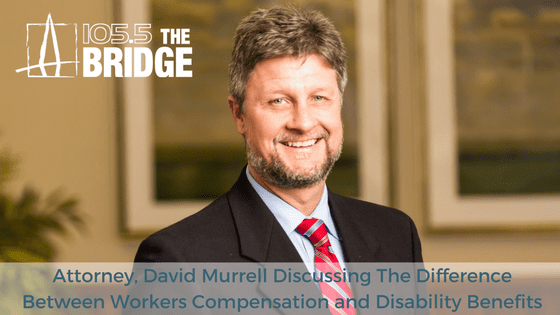The Difference Between Workers’ Compensation and Disability Benefits

Note: This was featured as part of our Wednesday segment on Charleston’s 105.5 The Bridge with Box in the Morning. You can catch us every other Wednesday morning at 8:50 am ET for the latest law tips and legal news. You can listen to the segment below:
If you are injured while working, or suffer an impairment that prevents you from holding a job, there are several financial aid programs available to you. Worker’s compensation is distributed to employees who are injured while at their job. If your injuries prevent you from working, either temporarily or permanently, you may be able to receive disability payments. Disability checks may or may not be associated with an on-the-job injury. If you are hurt, file a claim immediately and discuss payment plans with your employer. In addition to workers comp or disability, you may be eligible to receive unemployment or social security payments.
Workers’ compensation:
In every state, businesses are legally required to carry workers compensation insurance. However, keep in mind that the payments may not match your lost salary. If your injuries are moderate to severe, and especially if you require surgery, then you should seek legal counsel. If your diagnosis leaves you permanently unable to work, or if you have significant pre-existing conditions, then you may also need legal representation. Since workers comp laws are complex, you may want to consider legal counsel regardless of the severity of your injuries.
In most instances, worker’s comp provides better coverage than other disability services. Both medical bills and lost wages are covered by worker’s comp, and unlike disability and unemployment benefits, workers comp is tax-free. Workers comp will shoulder the entire cost of your medical fees. If you are unable to receive compensation from your employer and are forced to pay out of pocket, you may quickly reach and exceed your health care deductible. This leaves you with lost income and expensive medical bills.
If you have a solid case, you should aim for worker’s comp since it will pay higher than unemployment or disability. However, workers comp is more expensive for employers and it may be difficult to secure the payments you deserve without legal assistance.
Disability benefits
While engaged in a legal dispute with your employer over your compensation, you may be able to receive disability payments until the the case is settled. If the state’s disability check pays more than the amount you are receiving from workers comp, then you may be eligible for both at the same time. You may want to consider purchasing disability insurance depending on your medical or employment situation. If you already have personal disability insurance, file a claim with your provider.
Social Security disability payments
You may also be eligible to receive Social Security checks in addition to workers comp. If your diagnosis leaves you unemployed by at least 366 days or if your illness is terminal, you can apply for SSDI benefits. If you suffer from loss of hearing, vision, or speech, respiratory diseases, neurological disorders, or other serious impairments, then you may be eligible for Social Security payments. Claims will take 60-90 days before they are settled. Be prepared to wait an additional six months before collecting your first check.
Unemployment payments
In most cases, you cannot receive both workers comp and unemployment benefits at the same time. However, if there is no available work due to your injuries or if your employer is unable to rehire you, then you may be eligible for unemployment benefits on top of worker’s compensation. Unemployment benefits will generally last 26 weeks, but if you have a chronic or long-term illness then unemployment benefits may run out before you can return to work.
If you have additional questions regarding workers’ compensation or disability benefits, contact us to set up a free consultation.